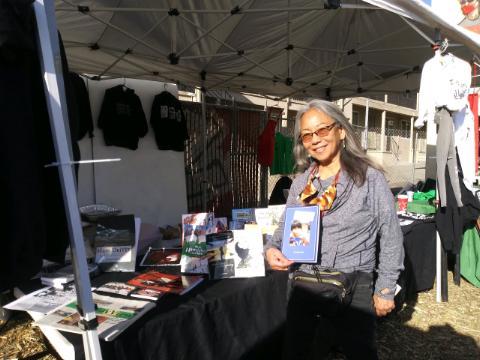A Morning with Elder Momii

In a classroom in deep East Huichin, Oakland, I sat on a couch at Homefulness, and talked to Momii about life and liberation. As she told me about her life, she sat up looking out into the room like it was a theatre, her eyes were deep, like looking into the bottom of a well of memories.
Momii says, passionately, “My life’s calling is to spread the word of homefulness and the POOR magazine philosophy!” I nodded in sincere agreement, I mean…I was sitting here also getting my dose, but I was curious to know more about what led her to this medicine.
What was Momii’s HerStory
Momii was born and raised in San Francisco, during what she described was something like a post-civil rights era mixed with the hippie scene. As the Vietnam War raged during her teen years, she became swept up in the movement against the war, she tells me “I connected with the history of Asians, not from school but from experiences; people I knew were asking ‘why are we fighting against people that look like us’ starting a huge conversation around Vietnam and why we were there.”
As we spoke, I was to understand more clearly what she meant.
Momii is the granddaughter of Japanese Issei, Japanese migrants who came to make a life in the United States. Her grandmother traveled across the ocean from Japan, arriving at Angel Island, arranged to marry her grandfather, a writer and staunch Japanese supremacist, who founded the 1st Japanese newspaper in Los Angeles. After the bombing of Pearl Harbor he was arrested by the FBI, because of his support of Ichiro. During this time, the United State began a war on the continent against Japanese families, kidnapping them into concentration camps forcing them to swear allegiance to the United States or be labeled as “No-No” boys and be separated from their families, some even being used to negotiate trading for US soldiers of war. Her family fled to avoid the camps, but were later caught and sent to Tule Lake. To avoid being separated they all agreed to swear their allegiance and were sent to Topaz, Utah.
I had known about these “internment” camps, rather, concentration camps, or family separation prisons in the middle of the desert very much like the ones being used all over the US today; not from history lessons in class (they didn’t teach that at the continuation high school I went to), but from my brother (his birthday is on the anniversary of the bombing of Pearl Harbor and he is also a Teacher) blessing me with mini lessons in decolonized history, but also from stories my grandfather would tell me about what it was like living in Hawai’i during this time. He told me stories of military occupation, martial law, curfews, bombings and living in such frightening times.
Back when I was young, I was ear hustling after bedtime and heard my grandfather talking story with the other elders around the table, of a good childhood friend who was taken away to one of these camps, and asked my grandfather to keep some of his things for him until he returned. I can’t remember if I heard him say if they ever reunited, or not; I was young and honestly it sounded so scary to me, as a young child, to think that one of my best friends could be taken away, that I hauled ass back to bed. Thinking back now, I might have even blocked out the ending from my memory, because it wasn’t my preferred outcome.
As I sit here with Momii, I feel pain for what her family went through. I can only imagine the stories she has heard, or been told; even worse, what was never told? I can feel the pain she holds for her ancestors, but more strongly, I feel her contempt for the injustice of it all.
In High School, Momii’s radical heart blossomed and she took to action, joining movements against the war in Angola, Sanrizuka at the airport, the Okinawan movement, also joining the San Francisco State ethnic studies strike, Momii describes, “It was an exciting time of my life, and made an impact on who I am today.”
As an adult, Momii became a Board and Care Administrator and Educator, working with developmentally disabled adults, which she found fulfilling, but found herself “burnt-out” after 17 years at the helm and decided to leave teaching. She decided to apply at the iconic Oaks Club, took dealer classes and became a Poker dealer. She felt teaching had prepared her for card dealing, and working with a variety of folks, who she described as “her kind of people, people on the edge.” A sly smile, and twinkling eyes looked back at me to see if I understood what she meant, I think I did; they’re my people too.
At the end of our interview, we sat for a while longer on the couch, organizing our notes. I was taking in all the powerful words and history Momii shared with me, the time had passed at warp speed and it felt like there was a lifetime of stories that didn’t even make the storytime, and we hadn’t even scratched the surface of Momii’s HerStory…we hadn’t.
The room had grown quiet because class was over, and I suddenly realized I was trembling, ever so slightly. I’m not sure if it was the chill in the winter air, or the powerful energy from Momii’s storytelling, but I realized, at that moment, that I was exactly where I was supposed to be.
There will be more stories to share with my SiStar Momii, on this couch, in deep East Huichin about life and liberation.
- Lori Herrera




